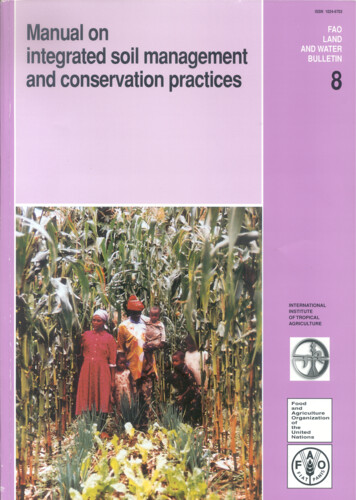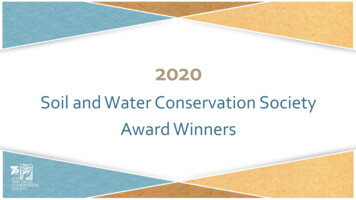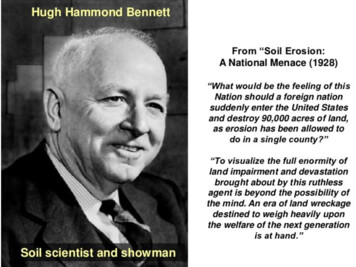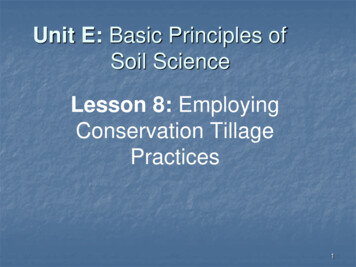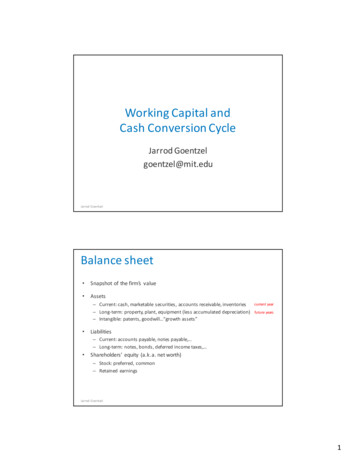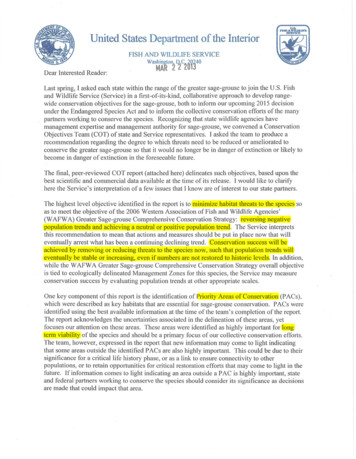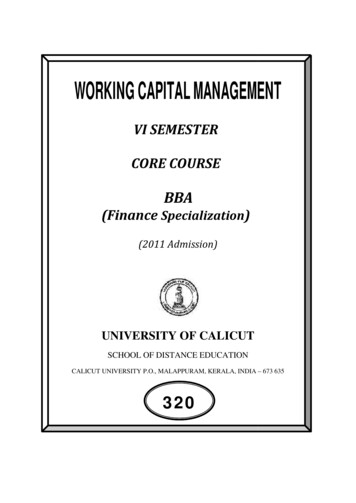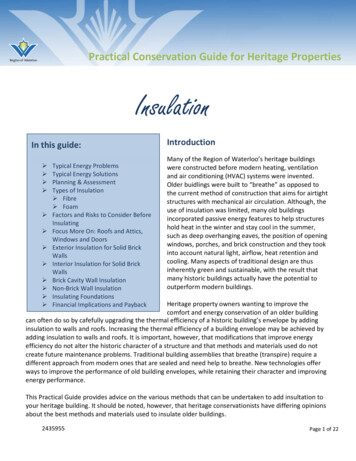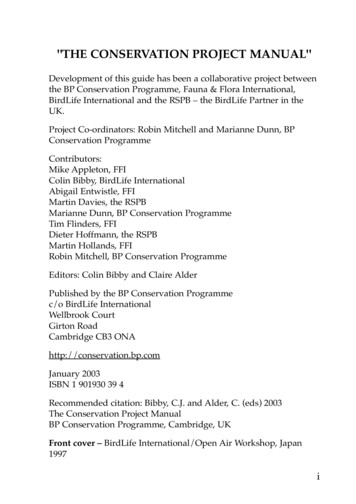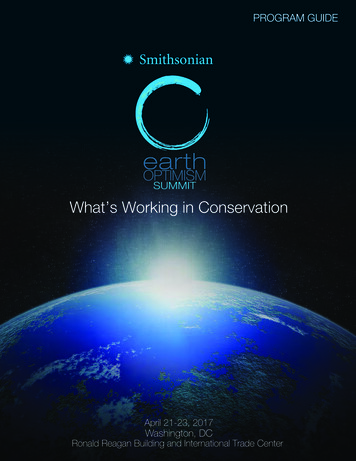
Transcription
PROGRAM GUIDEWhat’s Working in ConservationApril 21-23, 2017Washington, DCRonald Reagan Building and International Trade Center
EARTH OPTIMISM COMMITTEECO-CHAIRSNancy Knowlton, Sant Chair of Marine Science, National Museum of Natural HistorySteve Monfort, John & Adrienne Mars Director, Smithsonian Conservation Biology Institute, Chair, Conservation CommonsADVISORY GROUPTom Lovejoy, Chair, Earth Optimism Advisory GroupJohn Beardsley, Director of Garden and Landscape Studies, Dumbarton OaksPaul Butler, Senior Vice President of Global Programs, RARESamantha Campbell, President, Campbell FoundationRita Colwell, Distinguished Professor, University of MarylandTrammell S. Crow, Philanthropist, Founder, Earth Day TexasAlex Dehgan, Conservation X Labs, Duke University Innovator at LargeKathryn Fuller, Chair, Smithsonian National Museum of Natural HistoryGinette Hemley, Senior Vice President for Wildlife Conservation at World Wildlife FundAnson “Tuck” Hines, Director, Smithsonian Environmental Research CenterKirk Johnson, Sant Director, Smithsonian National Museum of Natural HistoryDennis Kelly, Director, Smithsonian’s National ZooNancy Knowlton, Sant Chair of Marine Science, Smithsonian National Museum of Natural HistoryRichard Kurin, Acting Provost and Under Secretary for Museums and Research, Smithsonian InstitutionMatthew C. Larsen, Director, Smithsonian Tropical Research InstituteChristopher Liedel, President, Smithsonian EnterprisesDavid M. Lodge, Director, Atkinson Center for a Sustainable Future. Cornell UniversityShirley Malcom, AAAS, Head of Education and Human Resources ProgramsSteve Monfort, John & Adrienne Mars Director, Smithsonian Conservation Biology InstituteChris Palmer, American University Center for Environmental FilmmakingKristin Rechberger, CEO, Dynamic PlanetConstance and Theodore Roosevelt IVCristián Samper, President of Wildlife Conservation SocietyRoger and Vicki SantJoel Sartore, author and photographer, National Geographic MagazineDavid J. Skorton, Secretary, Smithsonian InstitutionFern Shepard, Executive Director, Rachel’s NetworkJoshua Tewsbury, Director, Future EarthSUMMIT ORGANIZERSRuth Anna Stolk, Executive Director, Earth Optimism / Conservation CommonsSulema Castro, Program Brochure CoordinatorBrian Coyle, Youth and University EngagementErin Chapman, Program ManagerJessica Deichmann, Program CoordinatorCary Ridder, Partner and Sponsorship ManagerMarshall Jones, Government LiaisonGary Krupnick, Program SupportSharon Ryan, Public Programs and MarketingLauren Ward, Digital StrategyPRODUCTION COMPANYNalu Productions
THANK YOU TO OUR SPONSORSPLANETARY CO-SPONSORS:SmithsonianNational Zoological ParkConservation Biology InstituteTHE SECRETARY OF THE SMITHSONIANAND THE SMITHSONIAN NATIONAL BOARDSHINING SEAS SPONSORS:BLUE SKIES SPONSORS:ROGER AND VICKI SANTGREEN PEAK SPONSORS:CONTRIBUTING SPONSORS:INTERNATIONAL FUND FOR ANIMAL WELFARE (IFAW)NATIONAL PARK SERVICEROBERT AND ARLENE KOGODSUEZ CORPORATIONTONY AND GAY BARCLAY (LEWA CONSERVANCY, KENYA)ANNE B. KEISERASSOCIATION OF ZOOS & AQUARIUMSCARY RIDDERDICK AND NANCY RAINESRAY AND HELEN DUBOISST. LOUIS ZOOPresentation PartnersAAASAmerican University, School of Communication, Center forEnvironmental FilmmakingAssociation for Advancement of Sustainability in HigherEducationConservation X LabsDumbarton Oaks Mellon Initiative in Urban Landscape StudiesGlobal Co Labs Network/Teens DreamEarth Day TexasRachel’s NetworkSkyline Film FestivalStory ColliderSociety for Conservation BiologyUSAID
WELCOME TOTHE EARTH OPTIMISM SUMMITThis summit is about optimism and what’s working inconservation. Take advantange of this unique event to shareyour stories and successes, discover fresh ideas, inspireothers to action, and build collaborations to help sustain ourplanet.Brought to you by:TABLE OF CONTENTSWelcome from Secretary David J. Skorton2The Era of Earth Optimists2Program at a Glance3General Information5Map of Conference Center6Map of Innovation Commons / Exhibitors7Events and Exhibits8Program Schedule9Printed on 100% post-consumer waste paper stock
A Hopeful WelcomeWelcome to the Smithsonian’s Earth Optimism Summit. Since its founding more than170 years ago, the Smithsonian has been a global leader in science, working tounderstand and protect life on Earth. Today, the Institution has more than 500scientists conducting research on global conservation efforts. Among itssuccesses are the establishment of global forest and ocean-monitoring networksand saving critically endangered species from extinction such as the Panamaniangolden frog and the scimitar-horned oryx.One of the Smithsonian’s greatest strengths is the unique position we occupy atthe intersection of the arts, humanities, and sciences. Earth Optimism is an exampleof how we can leverage our position to gather many of the greatest minds on theplanet to address some of the most pressing issues of our time.Over the course of the next three days, you will hear inspiring stories of people who are making positive change for the planetthe world over. We hope their stories about what’s working in conservation will help set the stage to scale up and replicatesuccesses and create new opportunities for the research, partnerships, and public engagement necessary for futureconservation action. Enjoy the summit and thank you for the inspirational work you do to protect our planet for futuregenerations.David J SkortonSecretary, SmithsonianThe Era of Earth OptimistsThe Earth Optimism Summit is about hope. It’s about our collective progress in conserving our planet,the evidence of which is based on research and data. And it’s about looking forward to how we canreplicate and scale up our successes to have a greater impact in the future.While much news about the state of the environment is distressing, we think there is plenty of reasonto be optimistic. Many inspiring people are making positive change possible. These champions forconservation manage and restore ecosystems, save species from extinction, createcommunity-based conservation models that benefit both people and nature, and pioneer sustainablepractices for farming, fishing, urban living, among others. Successes like theirs, and support from agrowing number of citizens worldwide who share a vision where biodiversity and functioningecosystems are conserved for the benefit of human societies, and all life on earth, give us amplereason to feel optimistic about future Earth.We hope that people who attend the Earth Optimism Summit will come away feeling inspired andmotivated to take actions—large and small, personally and collectively—that build upon theknowledge and successes of others to sustain a biodiverse planet that benefits current and futuregenerations, and our planet.Nancy Knowlton and Steve MonfortCo-Chairs, Earth Optimism Summit2
PROGRAM AT A GLANCEFRIDAY, APRIL 217:30 amRegistration Open, Early Bird Friendly Coffee Session - Atrium Hall8:30 amNational Geographic Explorers Early Bird Coffee for Student Delegates - Atrium9:30 amPlenary: Opening Remarks, Opening our Minds, & Success in Conservation - Atrium Ballroom11:00 amSmithsonian Bird Friendly Coffee Break - AtriumDeep DivesLocationAmphitheater11:30 amInspiringPositive Action12:45 pmOceanicHemisphere AHemisphere BHuman Health &the Planet’s HealthBack fromthe BrinkNew FoodsMake for thePlanet PitchesApps for the PlanetThe Next GenerationThe Wild TableBeating psLunch - Atrium Hall1:45 pmSuccess in the City3:00 pmSmithsonian Bird Friendly Coffee Break - Atrium3:15 pm3PolarisGreen FarmingBlue FishingDoing More,Using LessCSI: Earth4:30 pmSmithsonian Bird Friendly Coffee Break - Atrium5:00 pmPlenary: Species and Spaces - Atrium Ballroom5:00 pmConservation Salons - Meridian6:30 pmDiscovery Channel Reception & Film Screening of Rancher, Farmer, Fisherman - Atrium7:30 pmStory Collider: Stories about Science - AtriumD&E- (Film at 7:30pm)Hall/ Amphitheater
SATURDAY, APRIL 227:30 amRegistration Open, Early Bird Friendly Coffee Session - Atrium Hall9:00 amPlenary: Science, Conservation, Inspiration - Atrium Ballroom10:30 amSmithsonian Bird Friendly Coffee Break - AtriumDeep DivesLocationAmphitheaterMovementof Life10:45 am12:00 pm12:30 pmPolarisOceanicHemisphere AHemisphere BWorking withCommunitiesWorking Landsand SeasThe Business ofSustainabilityNetworks thatDrive SolutionsLearning Lunch: Grab your lunch and head to a workshop - Atrium HallFilm: Second CenturyStewardshipMaking aWinning VideoUncorking CapacityBottlenecks2:00 pmPlenary: Energy & Efficiency - Atrium Ballroom3:30 pmSmithsonian Bird Friendly Coffee Break - AtriumKickstarter ectivesAt Home withConservationScience atthe EdgeIncomesfrom NatureEducation forConservationDeep Dives3:45 pm5:00 pm5:15 pm6:30 sonian Bird Friendly Coffee Break - AtriumRestoringNatureBig Ideasfor Big SpacesReception & Photo Ark images hosted by National Geographic & Smithsonian; Film Screening of Fragile Legacy - AtriumOur thanks toXavier Deshayes, Executive Chef of the Ronald Reagan Building and International Trade Center, and Feedback founderTristram Stuart, for their inventive menu ideas showcasing the delicious and surprising solutions to food waste.Green Mission: Recycling bins are located throughout the building for your use.4
PROGRAM AT A GLANCESUNDAY, APRIL 238:00 amRegistration Open, Early Bird Friendly Coffee Session - Atrium Hall9:00 amPlenary: From the Trenches - Amphitheater10:30 amSmithsonian Bird Friendly Coffee Break - Hosted by Roadmap.org - Atrium11:00 amPlenary: Looking Forward - Amphitheater12:30 pmPitches for the Planet - Amphitheater1:00 pmSmithsonian Bird Friendly Coffee Break - Atrium1:30 pmExplore the Exhibits & Activities in the Innovation Commons or Film Festival - AmphitheaterGENERAL INFORMATIONBUSINESS SERVICESINNOVATION COMMONS HOURSThe UPS Store is located in the Atrium and is openfrom 7:30 am – 6 pm Monday – Friday(Closed on the weekends).Plan to visit sponsor / participant booths in the Atriumduring the following times:CONFERENCE LOCATIONRonald Reagan Building and International Trade Center1300 Pennsylvania Ave NWWashington, DC 20004202-312-1300Disclaimer:The views expressed by outside speakers are theirown and do not necessarily represent the views of theSmithsonian Institution.5Friday, April 21: 7:30 am - 5:00 pmSaturday, April 22: 7:30 am - 5:00 pmSunday, April 23: 7:30 am - 4:00 pmWEBSITE / SOCIAL MEDIAWebsite: earthoptimism.si.eduTwitter: https://twitter.com/EarthOptimismHashtag: ptimism
MAP OF CONFERENCE CENTERATRIUM BALLROOMPLENARY SESSIONSFRIDAY & SATURDAYTODEEP ”CONSERVATIONX LABS“MAKE FORTHE PLANET”REGISTRATIONATRIUM HALLLOUNGE &MEALS6
MAP OF INNOVATION COMMONS / EXHIBITORSMakeforthePlanetKEY12Atkinson Center fora Sustainable Future,Cornell University192013Climatelinks181415511Conservation International1716BirdfriendlyCo eeStation383175Conservation Comics19International Fund forAnimal Welfare18What's Missing? Foundation10National Geographic8National Park Service14Ocean Optimism Selfie Station 124109276Roadmap.org20San Diego Zoo Global16Smithsonian Archives6Smithsonian EnvironmentalResearch Center7Smithsonian Libraries15Smithsonian ScienceEducation Center9Smithsonian TropicalResearch Institute6Smithsonian’s National Zoo &Conservation Biology Institute 11St. Louis Zoo713
EVENTS AND EXHIBITSFriday, April 215:00 pm – Meridian D & EConservation SalonsEarth Optimism and the Global Co-LabNetwork co-host Conservation Salons:Engaging the Next Generation. Localhigh school students meet with Summitexperts for deep dive discussionsdesigned to incubate change.6:30 pm – AtriumReception hosted by Discovery Channeland help save wildlife by supportingon-the-ground conservation efforts.1:30 pm – AmphitheaterMysteries of the Rainforest7:30 pm – AmphitheaterFragile LegacyA film that merges science, art, historyand marine conservation, that seeks outliving examples of the bizarre and beautifulsea creatures captured as glass reproductions by the Blaschka family 160 yearsago.Filmmaker David Brown will introduce thefilm, featuring Summit speaker DrewHarvell.7:30 pm – AmphitheaterThe filmmakers visited 10 countries totalk to pioneers who are re-inventingagriculture, energy, economy,democracy and education for a bettertomorrow.Directed by Cyril Dion and MélanieLaurent7:30 pm – Atrium HallSaturday, April 2212:30 pm – AmphitheaterSecond Century StewardshipThis film explores how science canbenefit parks and society throughpartnerships between AAAS, AcadiaNational Park, Schoodic Institute, and theU.S. National Park Service.Producer David Shaw will give a briefintroduction and answer audiencequestions.6:30 pm – AtriumNational Geographic and theSmithsonian host a reception featuringimages from the National GeographicPhoto Ark led by photographer JoelSartore. The Photo Ark is a multi-yeareffort to document every species living inthe world’s zoos and other protectedareas, inspire action through education,The island of Barro Colorado in thePanama Canal is full of mysteries. Everyyear, hundreds of scientists andstudents come here to uncover therainforest's secrets. This year the islandis running dry and no one knows why.Follow teams of scientists as they try tofind out what happened to the rain.Directed by Ciaran FlannerySmithsonian Channel3:00 pm – AmphitheaterTomorrowRancher, Farmer, FishermanThe film follows a new crop ofconservation heroes working inAmerica's Heartland.Directed by Susan Froemke, JohnHoffman, and Beth AalaPresented by Discovery ChannelStory Collider Theatre: bringing true,personal stories about science to life.Sunday, April 23 - FilmsInnovation CommonsExplore the exhibits and activities in the Innovation Commons, featuring the AtkinsonCenter for a Sustainable Planet at Cornell University, Smithsonian National Zoo /Conservation Biology Institute, Conservation International, and National Geographic.Friday, April 21:Saturday, April 22:Sunday, April 23:7:30 am - 5:00 pm7:30 am - 5:00 pm7:30 am - 4:00 pmAPRIL 21 – 23, AtriumFire-Sci Chats with the SmithsonianCasual 15-minute chats on hot topics and what’s working in conservation. Stop byfor a short take on giant panda obsession, wildlife tracking technology, coral reefcryopreservation, wild Bornean orangutans and the future of zoos. Held at theSmithsonian’s National Zoo and Conservation Biology Institute booth.Friday, April 21Saturday, April 22Sunday, April 2311:05 – 11:20 am4:35 – 4:50 pm10:30 – 10:45 am1:30 – 1:45 pm5:00 – 5:15 pm10:35 – 10:50 am12:35 – 12:50 pm8
PROGRAM SCHEDULEFriday, April 217:30 am - 9:30 amRegistration & Early Bird Friendly Coffee Session (Atrium)9:30 am - 11:00 amPlenary (Atrium Ballroom)Opening Our Minds - The summit begins with opening our minds to different views of the Earth, starting inouter space with a message from astronaut Peggy Whitsom of the International Space Station, and a global takeby National Geographic in a special Earth Optimism video. We get a glimpse of the natural world through theunique lens of the Spy Orangutan, and illustrious speakers kick off a marathon of stories, interactive exhibits, anda Make for the Planet competition.Moderator: Andrew Revkin, Pro Republica, & creator of Dot Earth, New York TimesSpeakers: Dr. Biruté (robotic orangutan) w/ handler Matthew Gordon; Muriel Bowser, Mayor, Washington, DC;Kathleen Rogers, Earth Day Network; David J. Skorton, Secretary, Smithsonian InstitutionSuccess in Conservation - Learn about nature’s true value to humanity, as well as a conservation idea thateveryone in the world can apply, and the power of dreams that dare people to seize opportunities to change theworld. This session invites delegates to rethink and reimagine the possibilities.Moderator: Andrew Revkin, Pro Republica, creator of Dot Earth, New York TimesSpeakers: Gretchen Daily, Natural Capital Project; Ayana Johnson, Ocean Collectiv; Anastasia Khoo,Conservation International; Tristram Stuart, Feedback, Toast Ale Ltd.11:00 am - 11:30 amSmithsonian Bird Friendly Coffee Break (Atrium)11:30 am - 12:45 pmInspiring Positive Action (Ampitheater)Join this session of storytellers, social marketers, and earth champions who are inspiring people in communitiesand cities everywhere to adopt sustainable behaviors. From massive beach cleanups to bike riding to betterenergy usage, learn about effective strategies that mobilize people to make Earth-friendly changes that benefitcommunities and the environment.Moderator: Kirk Johnson, SmithsonianSpeakers: Brett Jenks, Rare; Elin Kelsey, Elin Kelsey & Company/ Rachel Carson Center for Environment andSociety; Douglas McKenzie-Mohr, McKenzie-Mohr & Associates; Randy Olson, Prairie Starfish Productions;Afroz Shah, UN Environment Champion of the Earth9
11:30 am - 12:45 pmHuman Health & the Planet’s Health (Polaris)Conservation science has traditionally focused on the impact of humans on the planet’s health, but it turns outthat this is a two-way relationship. Explore how conserving healthy ecosystems can contribute significantly to ourown health.Moderator: Juli Trtanj, NOAASpeakers: Beth Allgood, International Fund for Animal Welfare; Drew Harvell, Cornell University; Ann Tutwiler,Bioversity International; Kinari Webb, Health in Harmony; Dawn Zimmerman, SmithsonianBack from the Brink (Oceanic)When only a handful of individuals remain, you might think all is lost for that species. Yet scientists are usingingenuity to save species even when the situation is dire, as illustrated by stories of Central Asian horses,California condors and other endangered species brought back from the brink.Moderator: Jamie Rappaport Clark, Defenders of WildlifeSpeakers: Alexis Gutierrez, NOAA; Michael Mace, San Diego Zoo Safari Park; Paul Marinari, Smithsonian; HankOppenheimer, University of Hawai i; Melissa Songer & Qing Cao, Smithsonian / Princeton UniversityNew Foods: Beyond the Green Revolution (Hemisphere A)Increasingly, the public wants food that tastes good and is good for the planet. Organic foods, new crops andlinking sustainable food providers to conscious consumers can help satisfy both desires.Moderator: Leslie Cockburn, Writer, Producer, FilmmakerSpeakers: Yao Afantchao, University of the District of Columbia; Rachel Bynum, Waterpenny Farm; MatthewDillon, Clif Bar & Company; Oran Hesterman, Fair Food Network; Hoyt Peckham, Smartfish, Pew Marine Fellow;Nora Pouillon, Organic Pioneer, founder of FreshFarm Markets, winner of James Beard Lifetime AchievementAwardMake for the Planet Pitches (Hemisphere B)18 diverse teams compete to create innovative solutions to thorny conservation challenges: Invasive species,valuation of ecosystem services, wildlife trafficking, overfishing, waste, and healthy oceans.Organizers: Alex Dehgan & Barbara Martinez, Conservation X Labs10
PROGRAM SCHEDULE12:45 pm - 1:45 pmLunch (Atrium Hall)1:45 pm - 3:00 pmDeep DivesSuccess in the City (Ampitheater)Modern cities have reputations as adversaries of environmental health due to urban sprawl, suffocating smogand garbage issues. Many of today’s cities, however, have become epicenters of environmental restoration,stewardship and education. Sponsored by the Mellon Initiative in Urban Landscape Studies at Dumbarton Oaks.Moderators: John Beardsley & Jeanne Haffner, Dumbarton Oaks Research Library & CollectionSpeakers: David Auerbach, Sanergy; Timothy Beatley, Biophilic Cities; Murray Fisher, New York HarborFoundation; Damon Rich, Hector urban designApps for the Planet (Polaris)From Paris to Panama, cell phones and other gadgets are ubiquitous. Now they are being turned to goodconservation use, providing valuable data on everything from trash to wildlife, and making it easy to become acitizen scientist.Moderator: John Kress, SmithsonianSpeakers: Stephen Box, Rare; Marshall Iliff, Cornell University; Jenna Jambeck, University of Georgia; JeffKirschner, Litterati & TED resident; Bill McShea, SmithsonianThe Next Generation (Oceanic)A new generation of conservationists and communicators is using social media platforms, and engaging morediverse voices in the conversation about science and conservation as they tackle a legacy of environmentalchallenges.Moderator: Jayde Lovell, SciQ, Young Turks Network.Speakers: Brooke Runnette, National Geographic; Justin Shaifer, Fascinate; Lauren Ward, Smithsonian; KurtMann, NOAA; Deidre Shelly, 350.orgThe Wild Table: Fish, Forests and Food Security (Hemisphere A)Wild fish and forests play a much more significant role in contributing to food security and resilience than you mayhave thought. Come learn more about innovative approaches and successes in integrating biodiversityconservation and food security and how we can save foods by savoring them. Sponsored by USAID.Moderator: Leslie Cockburn, writer, producer, filmmakerSpeakers: Nygiel Armada, ECOFISH Project; Kelsey Evezich, Duke University; Simran Sethi, journalist,educator, author; Terry Sunderland, Center for International Forestry Research (CIFOR)Beating Extinction (Hemisphere B)An ounce of prevention is worth a pound of cure. Hear about scientists working to save species in the wild –from rodents to rhinos – before their populations collapse.Moderator: Nigella Hillgarth, Center for Ecosystem Sentinels, University of WashingtonSpeakers: Nilanga Jayasinghe, World Wildlife Fund; Eric Miller, Saint Louis Zoo’s Wildcare Institute; Jean PierreSantos, Pro-Carnivoros Institute; Debra Shier, San Diego Zoo; Dennis Whigham, Smithsonian11
3:00 pm - 3:15 pmSmithsonian Bird Friendly Coffee Break (Atrium)3:15 pm - 4:30 pmGreen Farming Blue Fishing (Amphitheater)Global civilization depends on farming, fishing and aquaculture, and many human impacts on the planet areassociated with food production. Learn how successes in reducing some of these impacts are making a bigdifference.Moderator: Jeremy Jackson, SmithsonianSpeakers: Brandon Dennison, Coalfield Development Corp.; David Festa, Environmental Defense Fund; JeffMoyer, Rodale Institute; Sarah Redmond, Sorrento Seaweed, LLC; David Rosenberg, AeroFarmsCSI: Earth (Polaris)Organisms and ecosystems are beset by an onslaught of attackers: Whether these are invasive species,pathogens or poachers, scientists now have the tools to track these threats with cutting edge technology.Moderator: Ginette Hemley, World Wildlife FundSpeakers: Kathleen Gobush & Ted Schmitt, Vulcan Inc; Kali Holder, Smithsonian; David M. Lodge, AtkinsonCenter for a Sustainable Future, Cornell University; Sam Wasser, University of WashingtonDoing More Using Less (Oceanic)Huge advances in the feasibility and economics of sustainable energy use are helping solve the global threatsposed by energy production and pollution.Moderator: Scott Sklar, The Stella Group, Ltd.Speakers: Allison Archambault, EarthSpark International; Edwin A. Cowen, Atkinson Center for a SustainableFuture, Cornell University; Michael Healy, New Columbia Solar; Trey Taylor, Verdant Power; Elaine Ulrich, USDepartment of Energy; Jeff Weiss, Distributed SunPhilanthropy Roundtable (Hemisphere A)Private philanthropy is playing an increasing role in conservation, and leaders in this session will share theirthoughts about what motivates them to support conservation causes.Moderator: Fern Shepard, Rachel’s NetworkSpeakers: Alison Carlson, Forsythia Foundation; Barry Gold, Walton Family Foundation; Winsome McIntosh,McIntosh Foundation; Erin Rogers, Hewlett Foundation; Ed Warner, ColoradoPositive Partnerships (Hemisphere B)Conservation calls for cooperation, often involving governments, the private sector, conservation organizationsand individuals. The successes achieved by working together stretch from the savannahs of Africa to thelandscapes of New England and Virginia.Moderator: Dennis Kelly, SmithsonianSpeakers: Razan Al Mubarak, Mohamed Bin Zayed Species Conservation Fund; Latif Boru, NorthernRangelands Trust; Tom Butler, Tompkins Conservation; Chris Miller, Piedmont Environmental Council; PabloTaborga, PERU LNG12
PROGRAM SCHEDULE5:00 pm - 6:30 pmPlenary (Atrium Ballroom)Species and Spaces: Success in Protecting BiodiversityMeet world-renowned conservation champions who have made a difference in conserving species and spaces.Their approaches are diverse: a photographer raised global awareness of the value of the Ross Sea; aconservationist pushed for protecting lemurs – and then whole parks – in Madagascar; a National GeographicExplorer who protects seascapes; a Smithsonian scientist whose team helped coffee growers grow bird-friendlycoffee protecting migratory birds, and more.Moderator: Jon Paul Rodríguez, IUCN Species Survival Commission, ProvitaSpeakers: Joel Berger, Wildlife Conservation Society; Sean Gerrity, American Prairie Reserve; Pete Marra,Smithsonian; Enric Sala, Pristine Seas, National Geographic Explorer; Patricia Wright, MacArthur Fellow, SUNYStony BrookRemarks by John Hoffman, Discovery ChannelMicro Interviews: Matthew Dillon will interview Amy Johnson, Smithsonian and Matt Ogburn, Smithsonian5:00 pm – Meridian D & EConservation SalonsEarth Optimism and the Global Co-Lab Network co-host Conservation Salons: Engaging the Next Generation.Local high school students meet with Summit experts for deep dive discussions designed to incubate change.L e t ’schangethe worldtogether.Now more than ever, our planet needs all our help. That’s why5H[PVUHS .LVNYHWOPJ PZ L WHUKPUN P[Z UVUWYVÄ[ VYR [V WYV[LJ[ V\Y ocean, save wildlife, and fund scientists and explorers who aregoing further to push the boundaries of knowledge.YOU’RE INVITEDReception & Viewing of Photo Ark imagesHosts: National Geographic and Smithsonian6:30 pm13 Saturday, April 22 Atrium
Saturday, April 227:30 am - 9:00 amRegistration & Early Bird Friendly Coffee Session (Atrium)9:00 am - 10:30 amPlenary (Atrium Ballroom)Science, Conservation, InspirationPerformances by leading artists, thinkers and influencers open and close this session. Smithsonian’s SteveMonfort and Earth Optimism Advisory Group Chair Tom Lovejoy will host a series of launches announced byConservation Commons, Cornell, UNEP, Conservation@Museums Collaborative, Resolve, Half Earth, FutureEarth and Roadmap.org to build and scale up conservation success.Moderator / Introduction: Steve Monfort & Nancy Knowlton, SmithsonianSpeakers / Performers: Tom Lovejoy, Chair, Earth Optimism Advisory Group, Leah Barclay, Australia Forum forAcoustic Ecology; Carolyn Finney, professor, author; Pamela Henson, Smithsonian; JAYO, Rap Artist & TeensDream ambassador; Gary E. Knell, National Geographic Society; Erik Solheim, UN Environmental Program; MayaLin, What is Missing? Foundation and GREENPRINT; James Prosek, Peabody Museum of Natural History at Yale10:30 am -10:45 amSmithsonian Bird Friendly Coffee Break (Atrium)10:45 am -12:00 pmDeep DivesMovement of Life (Amphitheater)From eyes in the sky to ultralight tags and GPS trackers, scientists and the public can follow the movement oforganisms everywhere – from plants to people – and the data leads to better informed conservation planning.Moderator & Convener: Peter Leimgruber, SmithsonianSpeakers: Crystal Davis, World Resources Institute; Melissa Garren, Pelagic Data Systems; Autumn-LynnHarrison, Smithsonian; Michelle LaRue, University of MinnesotaWorking with Communities (Polaris)In local communities around the world, conservationists are emerging from unexpected sources, including gangsin Brazil and poachers in Namibia. The diversity of their actions rivals the diversity of the ecosystems they protectand restore.Moderator: Ron Swaisgood, San Diego Zoo GlobalSpeakers: Mark Bouman, The Field Museum; Andrea Heydlauff, African Parks; John Kasaona, NamibiaIntegrated Rural Development & Nature Conservancies; Bob Steneck, University of Maine; Sebastian Troëng,Conservation International14
PROGRAM SCHEDULE10:45 am -12:00 pmDeep DivesWorking Lands and Seas: How People and Nature Can Coexist (Oceanic)Learn about how unique ways to balance human and wildlife needs more wisely, whether it be sharing shippinglanes with whales or minimizing human conflicts with wildlife on land.Moderator: Anson “Tuck” Hines, SmithsonianSpeakers: Tremaine Gregory, Smithsonian; Jefferson Hall, Smithsonian; Roland Kays, North Carolina Museumof Natural Sciences; Nick Pyenson, Smithsonian; Suzanne Asha Stone, Wood River Wolf Project, Defenders ofWildlifeThe Business of Sustainability (Hemisphere A)The private sector is plays an important and growing role in reducing our impact on the planet. Water use andfood production – the cornerstones of human wellbeing – provide compelling examples of their innovative efforts.Moderator: Kristin Rechberger, Dynamic PlanetSpeakers: Jacqueline Claudia, LoveTheWild; Johanan Dujon, Algas Organics; Kevin McGovern, McGovernCapital, The Water Initiative; Paul McMahon, SLM Partners; Jessica Long, Accenture Strategy & SustainabilityNetworks that Drive Solutions (Hemisphere B)Networks are ubiquitous in human society: From networks of cities to networks of scientists, they make thewhole greater than the sum of its parts and spread good ideas across the planet.Moderator & Convener: Brendan Shane, C40 Cities Climate Leadership GroupSpeakers: Kara Ball, ecoAmerica; Shonda Gilliland Foster, David H. Smith Conservation Research Fellowship,Society for Conservation Biology; Marty Spitzer, World Wildlife Fund; Joshua Tewksbury, Future Earth12:00 pmLunch (Atrium Hall)12:30 pm - 1:45 pmBring your Lunch!NB: No food allowed in AmphitheaterFilm Screening - Second Century Stewardship (Amphitheater)The US National Park Service and Acadia National Park are uniquely posiitoned to more powerfully engagescience for the benefit of parks and society. More than 400 parks in the US national park system attract morethan 300 million visits annually, making it a remarkable platform
Steve Monfort, John & Adrienne Mars Director, Smithsonian Conservation Biology Institute, Chair, Conservation Commons ADVISORY GROUP . Joel Sartore, author and photographer, National Geographic Magazine David J. Skorton, Secretary, Smithsonian Institution Fern Shepard, Executive Director, Rachel’s Net
